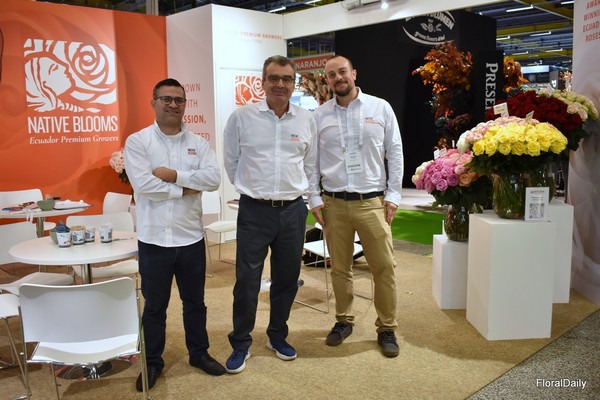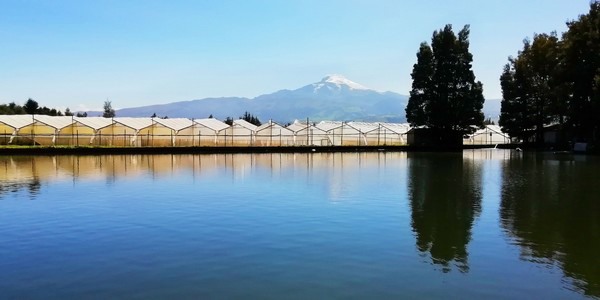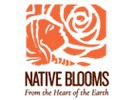These are exciting times with all the changes that are happening in the world and in the floral industry. Growers are constantly adapting and looking for ways to innovate and deal with these changes. Ecuadorian rose farm Native Blooms is a great example of an innovative farm that is increasingly looking for new opportunities to reduce waste, limit overproduction, and optimize their packaging. In this article, we'll discuss more about this farm and how they are dealing with the current challenges.

Elie Milan, Assaad Zard and Sebastian Olmedo at the IFTF 2022 in Vijfhuizen.
25+ years of growing roses
Native Blooms was founded in 1996 by a passionate, entrepreneurial family with the vision of providing the market with outstanding quality Ecuadorian roses. "Our success is a winning combination of high-quality products, long-term customer focus, and excellent service, all while remaining environmentally and socially conscious," explains Camilla Zard, Marketing Manager at the farm.
The farm currently has about 35ha under greenhouses with over 100 varieties of roses in production. The roses are exported worldwide. "We ship them to all five continents, and we always seek to reach more and more markets."
How the farm developed over the years
Rosas del Cotopaxi was the first farm to be developed by Native Blooms in 1996, Ms. Zard explains. "Situated in the Cotopaxi district, south of Quito, at an altitude of over 3,000 meters, the area is well suited for long-stem production and vibrant colors." After the success encountered with Rosas del Cotopaxi, Native Blooms acquired the Exxide farm in Tabacundo a few years later. "This was actually one of the first rose farms in the country. It is located at a similar altitude; its mild climate favors the production of reds as well as colors and benefits from the flow of crystalline water from the peaks of the Cayambe Volcano."

What makes their roses so special?
According to Ms. Zard, one of Native Blooms' distinctive features is that its two high-altitude farms are nestled in the slopes of the Cotopaxi and Cayambe volcanoes, giving the roses the ultimate microclimate in which to grow. Couple that with the proper cultivation techniques and a location at the earth's closest point to the sun, and you get the best roses the world has to offer. "Native Blooms' roses grow in near-perfect conditions. Let's not forget that Ecuadorian roses are famous for their full blooms, longer vase life, and tall stems."
Current challenges
As is the case for many farms, including Native Blooms, their main challenges are rising production costs, freight capacity, and currency fluctuations. "To counter these challenges, we are trying to grow and ship our product in the most efficient manner. For example, we are trying to optimize our packaging. Our aim is to find the most eco-friendly and cost-efficient way to ship our roses while maintaining their quality and our clients' needs as our top priority."
Limit overproduction
Another aim is to limit overproduction. "That includes reviewing the costs of all our inputs and finding new ways to optimize our workforce, be it through added training or redesigning our processes. We also try to keep close to our "cut-to-order" philosophy, which means anticipating the needs of the market and only producing and shipping products that have the highest probability of sale. We are also introducing more product lines. Dyed and tinted rose lines, for example, are becoming increasingly popular in the market, and so are garden roses."
For more information
Native Blooms
Salime Torbey
Email: salime.torbey@nativeblooms.com
www.nativeblooms.com
